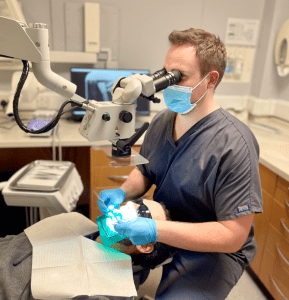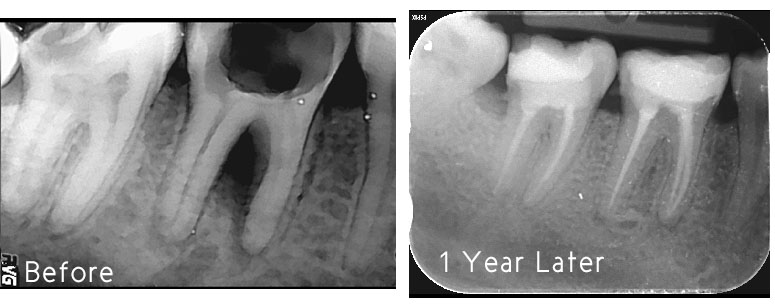Endodontic treatment FAQs
If you have been told you need a root canal treatment (RCT) and would like to find out more, our FAQs aim to help answer all your questions and alleviate any worries you may have. Root canal treatment is painless by using modern technology and techniques that Dr Skidmore utilises. If you are particularly nervous about root canal treatment we work with a seditionist who can provide IV sedation for your treatment for an additional fee.
Who will carry out my RCT?
Endodontics presents unique challenges and demands precise skill to achieve successful outcomes. At our dental practice, we understand the importance of receiving top-quality endodontic care, and we strive to provide exceptional root canal treatments to help you maintain your dental health.
While you may choose to receive root canal treatment from your regular dentist, we also offer the option to be treated by our in-house Dentist with Special Interest in Endodontics, Dr. Jonathan Skidmore. With access to a microscope, advanced equipment and techniques, Dr. Skidmore is well-equipped to handle even the most intricate endodontic cases.

Dr Jonathan Skidmore performing Root Canal Treatment using a microscope
Dedicated to delivering outstanding endodontic care, Dr. Skidmore devotes a significant portion of his clinical practice to performing root canal treatments. His wealth of experience, additional training, and qualifications in endodontics ensure that you receive the highest quality care for your dental needs.
Opting for a referral to Dr. Skidmore for your root canal treatment may lead to more predictable results, ultimately increasing the likelihood of preserving your natural tooth. Trust in his expertise to provide you with the best possible outcome.
The most complex cases may need to be referred out of the practice to an external specialist who has even higher levels of training and equipment.
Are there any risks?
- There is a moderate risk of pain and swelling immediately following treatment and for a few days afterwards. This is normally relieved by over-the-counter painkillers but can occasionally be more severe.
- Sometimes there can be a spreading infection from the tooth, which may need antibiotics.
- Root-canal instruments are very fragile- there is a possibility that one may break inside the tooth.
- The root filling may sometimes extend beyond the tip of the root, or may not completely fill the root to the tip.
- The tooth may be “perforated” (this is when a hole is made through the side of the tooth when searching for small canals)
Any of these complications may compromise the prognosis for the tooth and delay or prevent healing. In some cases, a serious complication may necessitate extraction of the tooth or referral to a specialist.
Will the tooth be safe after treatment?
Root filled teeth are weaker and more brittle than live teeth. For this reason it is often advisable to restore the root-filled tooth with a crown or onlay to reinforce the tooth.
We normally wait a few months after treatment so that we can be sure that the root canal treatment is OK prior to assessing whether crowning is advisable.
How much does Root Canal Treatment cost?
The vast majority of patients require non-surgical root canal treatment, which starts from £600. The price is relative to the number of roots each tooth has. Teeth further back in the mouth have more roots and therefore require more time and material cost and this is reflected in slightly increased fees. Please see our price list here
Finance your denture with Tabeo
It only takes 2 minutes to apply and you’ll get an answer straight away. Applying for a loan has never been easier.

Calculate my rate
Available for many treatments and for up to £30,000. Credit decisions will be subject to your individual circumstances. You must be over 18 and earn an income to apply.









